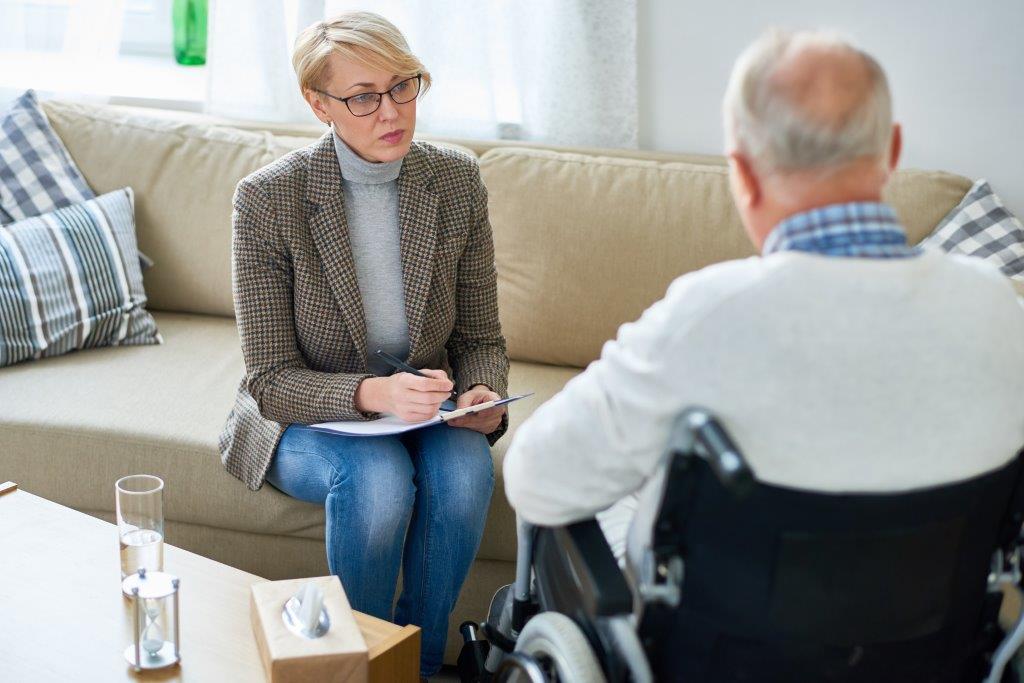
A CAPS professional is visiting with a potential client to learn more about his needs and how she and her team can help him live more comfortably and safely in his current, long-term home.
Everyone is aging
Getting older is not a phenomenon that affects just certain people or applies to specific parts of the world. It is totally universal. Every living thing – people, plants, and animals – as well as every inanimate object – land, buildings, roads, and more – gets older by the second. Sometimes the aging is appreciable, and other times it is hardly noticeable.
As for humans, we get older every day, and our needs and abilities correspondingly change. Over time, we lose a little of our physical ability. Some may also lose a little of their cognitive processing ability. Unless we work to replenish what we normally lose, our muscle strength, coordination, balance, and similar abilities weaken with age.
A general decline in our abilities occurs naturally as we get older. However, this is no time to throw in the towel or become depressed over life’s changing events. As exciting as our youth was with all of the things we could do – get by on just a little sleep, eat whatever we wanted, play until we were exhausted – and then be ready to do it again after just a short rest, and somehow survive all of the daredevil and risky things we did – aging has its perks also.
We don’t necessarily need to give in
As we get older, and as we find that doing some of the things we have been able to do seemingly forever are now more challenging or painful to do, we can give in to aging and give up some of those things that brought us satisfaction, or we can make accommodations. We can find different ways to do something that doesn’t cause us as much discomfort, for instance.
Aging is a ready-made excuse for not needing to prove athletic prowess to our peers (they likely are experiencing the same aging issues) or our grandchildren or others much younger than us. What we could do years ago is may not be relevant in the physical realm – just the memories of it and the stories we tell about it.
However, as we are getting older – whether we really feel any of the effects of aging or not – we owe it to ourselves and our loved ones that the homes we live in remain safe for us. As sensory changes occur (vision, hearing, balance, and coordination, for instance), and as our mobility may decline a little (taking a little longer to get from here to there or maybe having a couple of aches and pains that are relatively new) does not mean that we should turn our backs on home safety.
Focusing on aging in place
As we are gaining first-hand knowledge of what getting older feels like and some of the ways we need to adapt our life skills to continue to serve us well, we are perfectly positioned to serve others like us. A range of abilities and professional skills are appropriate for becoming a Certified Aging In Place Specialist – occupational therapists, physical therapists, handymen, remodelers, home builders, paramedics, non-profit organizations (especially special needs, veterans, and seniors), mobility equipment and durable medical equipment, assistive technology professionals, interior designers, kitchen and bath designers, architects, ADA consultants, space planners, organizational experts, social workers, gerontologists, physicians, and dozens more.
We are able to take our professional skills and apply them to a particular client’s living environment as we learn what will help them have a safer and more enjoyable lifestyle in their dwelling and what will allow them to remain living there long-term with a minimum of concerns about their space.
Visit CAPS Certification Training Classes to learn more about the Certified Aging In Place Specialist program and how you can participate.
